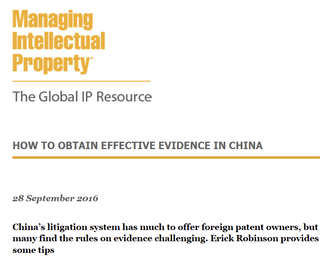 My latest article is now available at Managing IP. For a PDF copy, click here. Summary: There are many benefits to litigating in China, ranging from the vast size of the market and its key role in manufacturing many products to high win rates and low costs. But one drawback for many overseas patent owners is the lack of discovery or a similar process for obtaining evidence; this can be a significant obstacle to proving a case. Moreover, Chinese courts are known for being strict regarding what evidence is accepted. However, there are numerous varieties of evidence that are accepted in China including: documentary evidence, material evidence, witness testimony, expert conclusions and records of inquests. In many cases, notaries and private investigators have a vital role to play in obtaining and securing evidence in patent cases, and this requires careful management by the patent owner and its legal representatives. Leave a Reply. |
Welcome to the China Patent Blog by Erick Robinson. Erick Robinson's China Patent Blog discusses China's patent system and China's surprisingly effective procedures for enforcing patents. China is leading the world in growth in many areas. Patents are among them. So come along with Erick Robinson while he provides a map to the complicated and mysterious world of patents and patent litigation in China.
AuthorErick Robinson is an experienced American trial lawyer and U.S. patent attorney formerly based in Beijing and now based in Texas. He is a Patent Litigation Partner and Co-Chair of the Intellectual Property Practice at Spencer Fane LLP, where he manages patent litigation, licensing, and prosecution in China and the US. Categories
All
Archives
February 2021
Disclaimer: The ideas and opinions at ChinaPatentBlog.com are my own as of the time of posting, have not been vetted with my firm or its clients, and do not necessarily represent the positions of the firm, its lawyers, or any of its clients. None of these posts is intended as legal advice and if you need a lawyer, you should hire one. Nothing in this blog creates an attorney-client relationship. If you make a comment on the post, the comment will become public and beyond your control to change or remove it. |




 RSS Feed
RSS Feed